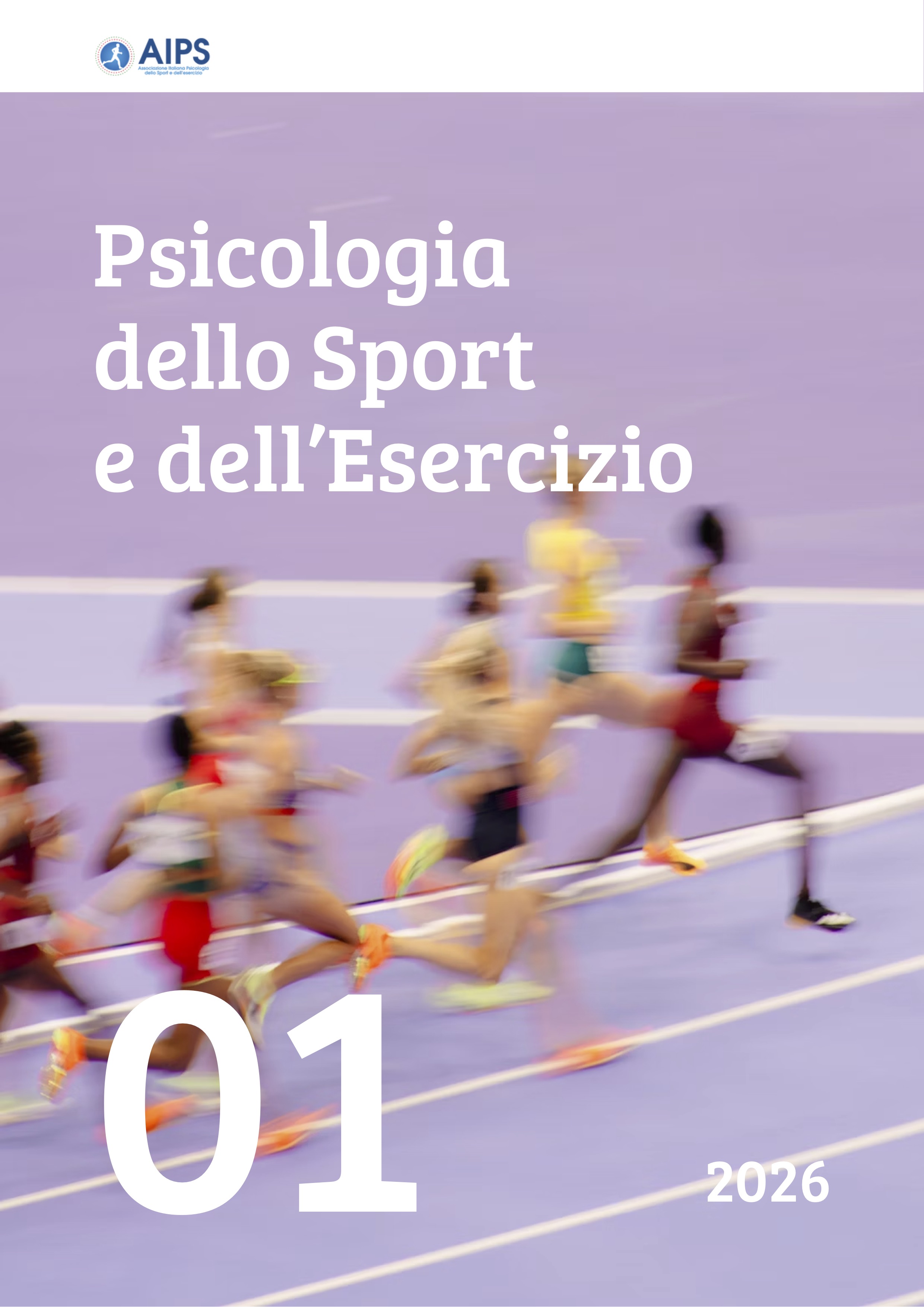Il Ruolo della Compassione nella Performance Atletica, nella Riduzione dello Stress e nella Promozione di un Ambiente Sportivo Positivo
Parole chiave:
autocompassione, resilienza, benessere mentale, psicologia dello sport, motivazione intrinseca, pedagogia degli erroriAbstract
La compassione, definita come l’attitudine a riconoscere la sofferenza propria e altrui con l’intento di alleviarla, ha ricevuto crescente attenzione nelle scienze psicologiche e sociali. In ambito sportivo, recenti evidenze suggeriscono che, l’integrazione della compassione nei processi relazionali e formativi può migliorare significativamente la performance, ridurre lo stress e contribuire allo sviluppo di ambienti sportivi più sani e inclusivi; la compassione può generare un clima relazionale favorevole allo sviluppo del talento, alla gestione della pressione e alla coesione del gruppo. Il presente articolo esamina le basi teoriche e le implicazioni pratiche della compassione nello sport competitivo.
Riferimenti bibliografici
Adam, M. E. K., Eke, A. O., & Ferguson, L. J. (2021). “Know That You're Not Just Settling”: Exploring Women Athletes' Self-Compassion, Sport Performance Perceptions, and Well-Being Around Important Competitive Events. Psychology of Sport and Exercise. Pubblicato online su PubMed: https://pubmed.ncbi.nlm.nih.gov/33894692Bryant, K. (2018). The Mamba Mentality: How I Play. Milano: Mondadori.
D’Angelo, C. (2020). La letteratura sportiva: un approccio critico. La letteratura e noi. https://www.laletteraturaenoi.it
Deci, E. L., & Ryan, R. M. (2000). Self-determination theory and the facilitation of intrinsic motivation, social development, and well-being. American Psychologist The role of emotional intelligence and quality relationships in athletes’ and coaches’ levels of satisfaction: a multi-study analysis Autori: S. Jowett, S. Wachsmuth, I. D. Boardley, A. L. Balduck Rivista: Sports Coaching Review (2024)
Edmondson, A. (1999). Psychological safety and learning behavior in work teams. Administrative Science Quarterly, 44(2), 350–383.
Edmondson, A. C., & Lei, Z. (2014). Psychological Safety: The History, Renaissance, and Future of an Interpersonal Construct. Annual Review of Organizational Psychology and Organizational Behavior
Fransen, K., Boen, F., Stouten, J., Cotterill, S., & Vande Broek, G. (2017). Optimal environments for team functioning in sport organizations. In C. R. D. Wagstaff (a cura di), The Organizational Psychology of Sport: Key Issues and Practical Applications (pp. 53–70). London: Routledge.
Gilbert, P. (2007). Psychotherapy and Counselling for Depression (3ª ed.). London: Sage.
Gilbert, P. (2009). The Compassionate Mind. London: Constable & Robinson / Oakland, CA: New Harbinger.
Gilbert, P. (2010). Compassion Focused Therapy: Distinctive Features. London: Routledge. Trad. it. a cura di Petrocchi, N. (2012). La terapia focalizzata sulla compassione. Caratteristiche distintive. Milano: Franco Angeli.
Kuchar, A. L., Neff, K. D., & Mosewich, A. D. (2023). Resilience and Enhancement in Sport, Exercise, & Training (RESET): A brief self-compassion intervention with NCAA student-athletes. Psychology of Sport and Exercise, 67, 102426.
MyLLENNIUM Award. (2024). Letteratura sportiva: 10 libri sullo sport da leggere assolutamente. https://www.myllenniumaward.org
Mosewich, A. D., Crocker, P. R., Kowalski, K. C., & DeLongis, A. (2013). Applying self-compassion in sport: An intervention with female athletes. Journal of Sport and Exercise Psychology, 35(5), 514–524.
Neff, K. D. (2003a). Self-compassion: An alternative conceptualization of a healthy attitude toward oneself. Self and Identity, 2(2), 85–101.
Neff, K. D. (2003b). The development and validation of a scale to measure self-compassion. Self and Identity, 2(3), 223–250.
Neff, K. D., Kuchar, A. L., & Mosewich, A. D. (2023). Resilience and Enhancement in Sport, Exercise, & Training (RESET): A Brief Self-Compassion Intervention with NCAA Student-Athletes. Psychology of Sport and Exercise, 65, 102334
Petrocchi, F. (2003). Sport e letteratura nella storia. In Enciclopedia dello Sport. Roma: Istituto della Enciclopedia Italiana Treccani.
Pasolini, P. P. (1971). Il calcio è un linguaggio con i suoi poeti e prosatori. In Scritti corsari (pp. 123–126). Milano: Garzanti.
Reis, H. T., Sheldon, K. M., Gable, S. L., Roscoe, J., & Ryan, R. M. (2000). Daily well-being: The role of autonomy, competence, and relatedness. Personality and Social Psychology Bulletin, 26(4), 419–435. https://doi.org/10.1177/0146167200266002
Reis, H. T., Sheldon, K. M., Gable, S. L., Roscoe, J., & Ryan, R. M. (2015). Daily well-being: The role of autonomy, competence, and relatedness. Personality and Social Psychology Bulletin, 41(7), 1044–1056.
Rockliff, H. E., Gilbert, P., McEwan, K., Lightman, S. L., & Glover, D. A. (2008). A pilot exploration of heart rate variability and salivary cortisol responses to compassion-focused imagery. Clinical Neuropsychiatry, 5(3), 132–139.
Roeser, R. W., Skinner, E., Beers, J., & Jennings, P. A. (2014) Mindfulness training and teachers’ professional development: An emerging area of research and practice Rivista: Child Development Perspectives
Downloads
Pubblicato
Versioni
- 2025-11-03 (2)
- 2025-10-21 (1)
Come citare
Fascicolo
Sezione
Licenza
Copyright (c) 2026 Francesca Praticò

TQuesto lavoro è fornito con la licenza Creative Commons Attribuzione 4.0 Internazionale.
Gli autori mantengono i diritti d’autore sulla propria opera e concedono alla rivista il diritto di prima pubblicazione, contemporaneamente licenziata sotto una Licenza Creative Commons Attribuzione 4.0 Internazionale (CC BY 4.0), che consente uso, condivisione, adattamento, distribuzione e riproduzione in qualsiasi mezzo o formato, a condizione che sia riconosciuta la paternità dell’opera e indicata la prima pubblicazione su questa rivista. Gli autori possono stipulare accordi aggiuntivi non esclusivi per la distribuzione della versione pubblicata (es. deposito in archivi istituzionali o pubblicazione in volumi), indicando la pubblicazione iniziale su questa rivista.
Licenza completa: https://creativecommons.org/licenses/by/4.0/deed.it



